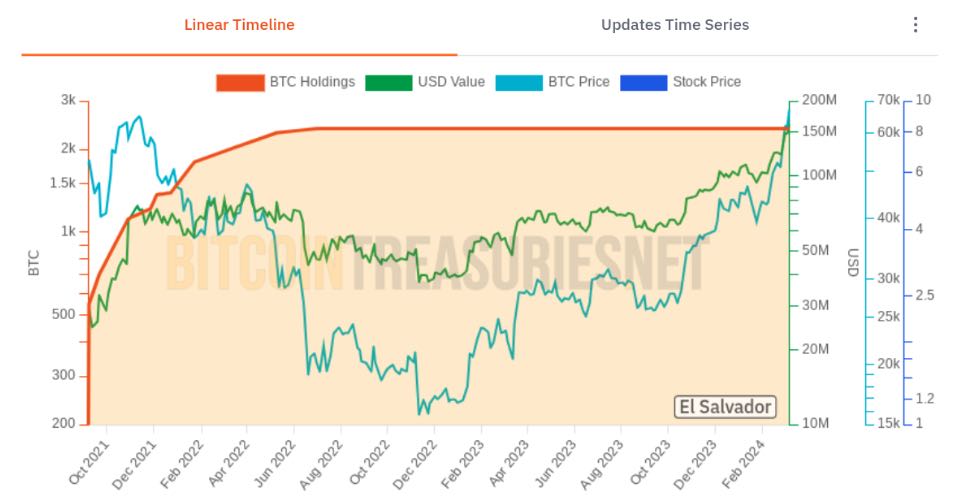In a bold stride into the financial future, El Salvador‘s foray into Bitcoin investment has marked a significant milestone, with the nation’s Bitcoin holdings reaching a staggering $164 million. This pioneering move, which saw the country embrace Bitcoin as legal tender, has not only positioned El Salvador as a trailblazer in the cryptocurrency world but has also yielded impressive profits surpassing $50 million. This development is a beacon for nations contemplating the integration of digital currencies into their economies, offering insights into the potential rewards and challenges of such an endeavor.
El Salvador’s Bitcoin Journey
El Salvador made headlines in September 2021 by becoming the first country to adopt Bitcoin as legal tender, a move championed by President Nayib Bukele. This decision was met with a mix of admiration, skepticism, and criticism from various quarters, including international financial institutions and economic experts. Despite the controversies, the government proceeded to invest heavily in Bitcoin, aiming to leverage the cryptocurrency’s potential for economic growth and financial inclusion.
Record Bitcoin Holdings

The recent announcement of El Salvador’s Bitcoin holdings peaking at $164 million underscores the country’s commitment to its digital currency strategy. This accumulation reflects not only the government’s confidence in Bitcoin’s value proposition but also its dedication to diversifying the nation’s assets and reducing reliance on traditional financial systems.
Soaring Profits Amid Volatility
The revelation that El Salvador’s Bitcoin investments have generated profits exceeding $50 million is a testament to the volatile yet lucrative nature of the cryptocurrency market. These profits come amidst fluctuating Bitcoin prices, highlighting the risks and rewards inherent in the digital currency landscape. For El Salvador, these gains represent a significant boost to the national treasury, potentially funding social and infrastructure projects that could benefit its citizens.
Implications for Global Finance
El Salvador’s Bitcoin initiative has sparked a global conversation about the role of cryptocurrencies in national economies. While critics point to the risks of volatility and regulatory challenges, proponents argue that digital currencies offer opportunities for financial innovation, inclusion, and independence from traditional banking systems. El Salvador’s experience serves as a real-world case study, offering valuable lessons for other countries considering a similar path.
Challenges and Future Outlook
Despite the financial gains, El Salvador’s Bitcoin journey is not without its hurdles. Issues such as market volatility, regulatory scrutiny, and the need for widespread public education on cryptocurrency use remain pressing challenges. Moreover, the long-term impact of this venture on the country’s economy and financial stability is yet to be fully realized.
Conclusion
El Salvador’s record Bitcoin holdings and the profits accrued from its cryptocurrency investments mark a significant chapter in the nation’s economic narrative. While the journey has been fraught with challenges, the potential rewards have thus far validated the country’s ambitious Bitcoin experiment. As El Salvador continues to navigate the complexities of the cryptocurrency world, its experience offers invaluable insights for the global community, heralding a new era of financial exploration and innovation.
El Salvador’s decision to adopt Bitcoin as legal tender was driven by the desire to stimulate economic growth, promote financial inclusion, and diversify the nation’s assets away from traditional financial systems.
El Salvador’s Bitcoin holdings have reached a record $164 million, reflecting the country’s significant investment in the cryptocurrency as part of its strategy to integrate digital currencies into its economy.
El Salvador has realized over $50 million in profits from its Bitcoin investments, highlighting the lucrative potential of the cryptocurrency market despite its inherent volatility.
The potential benefits include a boost to the national treasury from Bitcoin profits, which could fund social and infrastructure projects, and the promotion of financial inclusion by providing access to digital currencies for its citizens.
Challenges include dealing with the volatility of Bitcoin prices, navigating regulatory scrutiny, educating the public on cryptocurrency use, and assessing the long-term impact on the country’s economic and financial stability.

